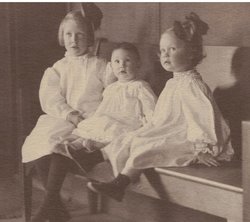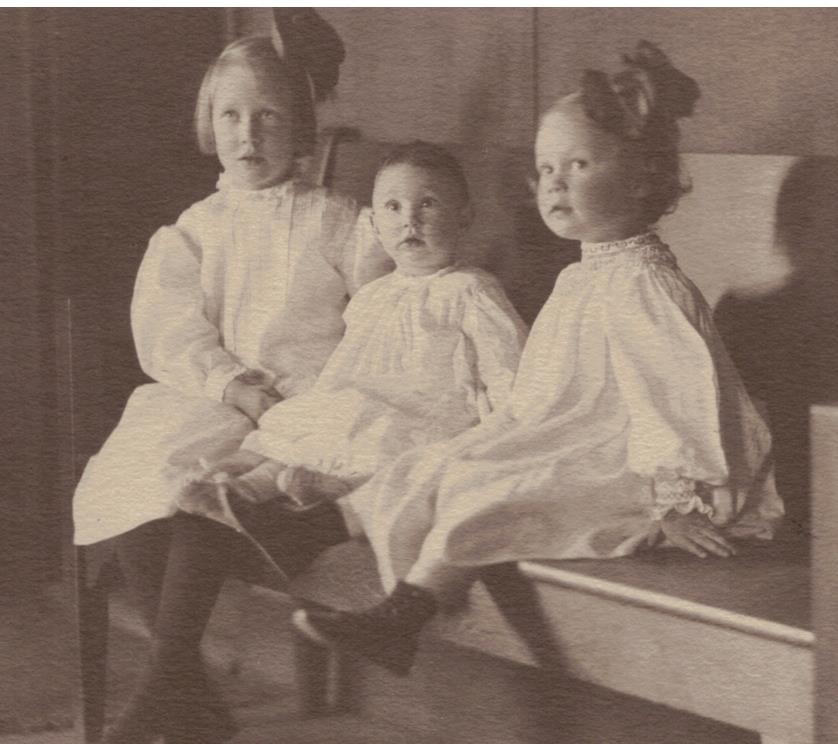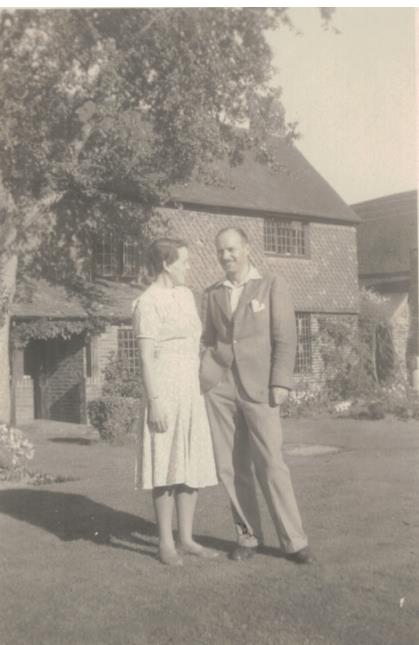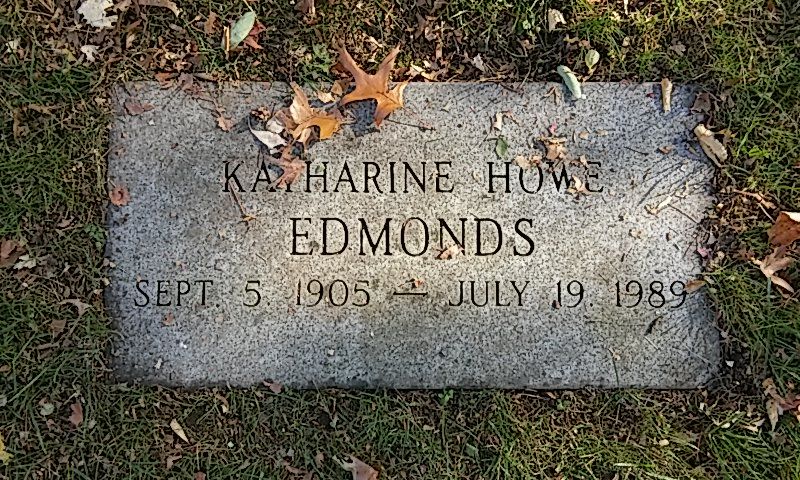Katharine Parris Howe married, first, on 25 September 1926 at St. John the Baptist, Woking, Surrey ENG, Col. Christopher Jerome Teesdale "Kit" Baker-Carr, soldier and engineer, (31 December 1903 Kent ENG-01 December 1970 at Saint Albans Hospital, Saint Albans, Hertfordshire ENG), son of Brigadier-General Christopher D'arcy Bloomfield Saltern Baker-Carr of Camelford ENG and Sarah De Witt Quinan Baker-Carr of San Francisco CA.
Katharine Parris and Christopher Jerome Teesdale had: 1 Christopher D'arcy Teasdale Baker-Carr (3rd quarter (03 July) 1929 district of Kensington (Volume 1a, Page 151), county of London ENG; died 25 October 2012 Reims, Marne, Champagne-Ardenne, France; Christopher married twice and has issue from both marriages);
and two daughters.
Katharine Parris Howe and Christopher J.T. Baker-Carr divorced by 1946.
Katharine Parris Howe Baker-Carr married, second, in 1956, Walter Dumaux Edmonds, Jr., author, "Drums Along The Mohawk" and other historical novels, (15 July 1903 Boonville NY-24 January 1998 Concord MA; Walter Dumaux Edmonds cremated, 1-29-1998, Mount Auburn Cemetery; his son, Peter Bulkeley Edmonds, signed for his cremains at Mount Auburn; burial site, unknown), son of Walter Dumaux Edmonds, Sr., patent lawyer, and Sarah May both of New York; Katharine Parris and Walter Dumaux, Jr. had no issue.
Obituary:
Walter D. Edmonds, the author of ''Drums Along the Mohawk'' and many other historical novels set in upstate New York, died on Saturday (24 January 1998) at his home in Concord, Mass. He was 94. Mr. Edmonds was best known for his realistic representations of history as seen through the lives of ordinary fictional characters. He was concerned, as he once wrote, ''with life as it was; as you or I, our mothers or our wives, our brothers and husbands and uncles, might have experienced it.'' Half of his 34 books were for children. In 1942 he won a Newbery Medal for ''The Matchlock Gun,'' about a boy in Colonial New York who defends his home against invading Indians. In 1976, he won a National Book Award for ''Bert Breen's Barn,'' whose main character was based, Mr. Edmonds said, on the man who showed him how to tie his shoelaces ''so they never came undone, until you wanted them to.'' He was born on July 15, 1903, at his family's summer retreat outside Boonville, N.Y., near the Black River. In 1926 he graduated from Harvard College. Although his father, a patent lawyer, wanted him to become a chemical engineer, Mr. Edmonds found another path. He started publishing his fiction at Harvard and became the editor of The Advocate, Harvard's literary magazine. In his fiction, as in his life, Mr. Edmonds was most at home in the Mohawk River Valley and the Black River Canal. He said his life belonged ''far more to the farm than with my own family.'' His first novel, ''Rome Haul,'' a book about the Erie Canal, was published in 1929 and was turned into a Broadway play, ''The Farmer Takes a Wife,'' by Marc Connelly and Frank Elser. Mr. Edmonds's best known work was ''Drums Along the Mohawk,'' a fictional tale of the settlers of the Mohawk Valley in Revolutionary times. The book, published in 1936, was a best seller for two years, taking a back seat only to ''Gone With the Wind.'' In 1939, it was made into a movie, directed by John Ford and starring Henry Fonda and Claudette Colbert. ''Chad Hanna,'' Mr. Edmonds's novel about the circus, published in 1940, was praised by R. L. Duffus in a book review in The New York Times for his ''painstaking accumulation of yesterday's commonplaces,'' and for catching ''the incidental things.'' It also became a movie, with Dorothy Lamour, Linda Darnell and Henry Fonda. Mr. Edmonds published many of his stories in The Atlantic Monthly, Dial, McCall's, The Saturday Evening Post, The Forum and Scribner's before they came out as books. His last book, ''Tales My Father Never Told,'' was published in 1995.
Katharine Parris Howe married, first, on 25 September 1926 at St. John the Baptist, Woking, Surrey ENG, Col. Christopher Jerome Teesdale "Kit" Baker-Carr, soldier and engineer, (31 December 1903 Kent ENG-01 December 1970 at Saint Albans Hospital, Saint Albans, Hertfordshire ENG), son of Brigadier-General Christopher D'arcy Bloomfield Saltern Baker-Carr of Camelford ENG and Sarah De Witt Quinan Baker-Carr of San Francisco CA.
Katharine Parris and Christopher Jerome Teesdale had: 1 Christopher D'arcy Teasdale Baker-Carr (3rd quarter (03 July) 1929 district of Kensington (Volume 1a, Page 151), county of London ENG; died 25 October 2012 Reims, Marne, Champagne-Ardenne, France; Christopher married twice and has issue from both marriages);
and two daughters.
Katharine Parris Howe and Christopher J.T. Baker-Carr divorced by 1946.
Katharine Parris Howe Baker-Carr married, second, in 1956, Walter Dumaux Edmonds, Jr., author, "Drums Along The Mohawk" and other historical novels, (15 July 1903 Boonville NY-24 January 1998 Concord MA; Walter Dumaux Edmonds cremated, 1-29-1998, Mount Auburn Cemetery; his son, Peter Bulkeley Edmonds, signed for his cremains at Mount Auburn; burial site, unknown), son of Walter Dumaux Edmonds, Sr., patent lawyer, and Sarah May both of New York; Katharine Parris and Walter Dumaux, Jr. had no issue.
Obituary:
Walter D. Edmonds, the author of ''Drums Along the Mohawk'' and many other historical novels set in upstate New York, died on Saturday (24 January 1998) at his home in Concord, Mass. He was 94. Mr. Edmonds was best known for his realistic representations of history as seen through the lives of ordinary fictional characters. He was concerned, as he once wrote, ''with life as it was; as you or I, our mothers or our wives, our brothers and husbands and uncles, might have experienced it.'' Half of his 34 books were for children. In 1942 he won a Newbery Medal for ''The Matchlock Gun,'' about a boy in Colonial New York who defends his home against invading Indians. In 1976, he won a National Book Award for ''Bert Breen's Barn,'' whose main character was based, Mr. Edmonds said, on the man who showed him how to tie his shoelaces ''so they never came undone, until you wanted them to.'' He was born on July 15, 1903, at his family's summer retreat outside Boonville, N.Y., near the Black River. In 1926 he graduated from Harvard College. Although his father, a patent lawyer, wanted him to become a chemical engineer, Mr. Edmonds found another path. He started publishing his fiction at Harvard and became the editor of The Advocate, Harvard's literary magazine. In his fiction, as in his life, Mr. Edmonds was most at home in the Mohawk River Valley and the Black River Canal. He said his life belonged ''far more to the farm than with my own family.'' His first novel, ''Rome Haul,'' a book about the Erie Canal, was published in 1929 and was turned into a Broadway play, ''The Farmer Takes a Wife,'' by Marc Connelly and Frank Elser. Mr. Edmonds's best known work was ''Drums Along the Mohawk,'' a fictional tale of the settlers of the Mohawk Valley in Revolutionary times. The book, published in 1936, was a best seller for two years, taking a back seat only to ''Gone With the Wind.'' In 1939, it was made into a movie, directed by John Ford and starring Henry Fonda and Claudette Colbert. ''Chad Hanna,'' Mr. Edmonds's novel about the circus, published in 1940, was praised by R. L. Duffus in a book review in The New York Times for his ''painstaking accumulation of yesterday's commonplaces,'' and for catching ''the incidental things.'' It also became a movie, with Dorothy Lamour, Linda Darnell and Henry Fonda. Mr. Edmonds published many of his stories in The Atlantic Monthly, Dial, McCall's, The Saturday Evening Post, The Forum and Scribner's before they came out as books. His last book, ''Tales My Father Never Told,'' was published in 1995.
Family Members
Sponsored by Ancestry
Advertisement
Advertisement












